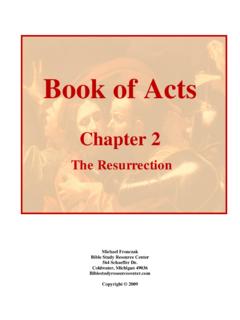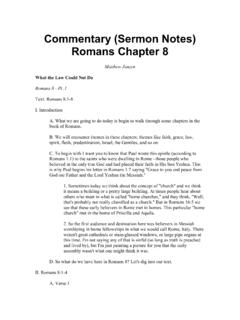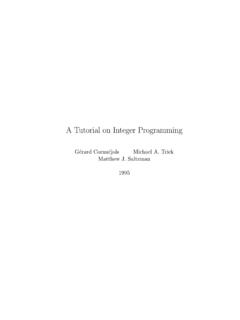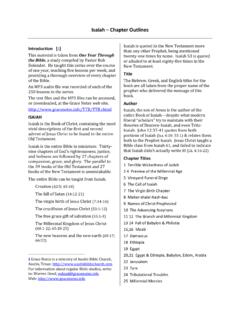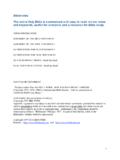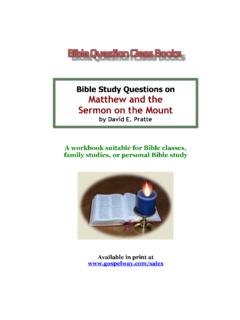Transcription of Book of James - Bible Study Resource Center
1 book of James Chapter 1 Theme: God tests faith by trials; God does not test with evil; God tests faith by the Word, not by man s words Michael Fronczak Bible Study Resource Center Beit-Lechem Ministries 564 Schaeffer Dr. Coldwater, Michigan 49036 Copyright 2010 1 Theme: God tests faith by trials; God does not test with evil; God tests faith by the Word, not by man s words CHART: CHAPTER SUMMARY OF THE book OF James James 1 Confident Stand What a Christian has James 2 Compassionate Service What a Christian does James 3 Careful Speech What a Christian says James 4 Contrite Submission What a Christian feels James 5 Concerned Sharing What a Christian gives An epistle written by Jacob to the descendants of Israel. Jacobos in Greek; Jacques in French; Iago in Italian; Diego in Spanish; Ya kov in Hebrew; = the supplanter; heel-catcher; tripper-up (Hos 12:3).1 James James was not the one called the son of Zebedee ( matthew 4:21, note) or the son of Alphaeus ( Luke 24:10, note), but the actual half-brother of Jesus Christ ( matthew 13:55; Mark 6:3; Galatians 1:19).
2 See note, Luke 8:19, for proof that Mary had other children after Jesus was born. Christ's brethren did not believe in Him until after the resurrection (John 7:5), but the other two men named James did. This James experienced a special appearance of Christ but is not classed as an apostle (1 Cor. 15:7). This verse alone proves that there were three James 's, for the other two were apostles ( matthew 10:2-3). It is always clear in Scripture when the other two are meant. Mary, the sister of the virgin Mary, had only two sons and one daughter ( matthew 27:56; Mark 15:40; Mark 16:1; Luke 24:10). The fact that her sons had the same names as two sons of the virgin Mary proves nothing. The brethren of Jesus are distinguished from the two apostles called James (Acts 1:13-14). The virgin Mary had more sons and daughters than did her sister Mary ( matthew 13:55; Mark 6:3). Jude was the brother of James of this book (Jude 1:1). It is safe to conclude that when James is referred to without any designation as "brother of John," "son of Zebedee," or "son of Alphaeus," that James the brother of our Lord is 1 Chuck Missler, Notes on James , 2 meant (Acts 12:2,17; Acts 15:13; Acts 21:18; 1 Cor.)
3 15:7; Galatians 1:19; Galatians 2:9,12; James 1:1; Jude 1:1). James was martyred in James wrote to Jewish Christians who were scattered abroad . The book of Acts tells us that the Christians in Jerusalem were compelled by persecution to scatter throughout Judea and Samaria (Acts 8:1) and even as far as Phoenicia, Cyprus and Antioch (Acts 11:19). Fleeing did not always solve the problem, as many Christians also encountered persecution in their new homes. The trials of life often shake our faith and cause us to let up in service. In other words, hardships and difficulties can diminish the reality of religion. James wrote to help his readers have such reality. The Bible has quite a bit to say about Christians suffering. It tells us about the suffering of some of its greatest heroes. Job, Moses, Joseph, Paul and Peter are just a few who had to endure exceedingly difficult McGee Introduction: The Epistle of James is a very practical book which deals with the ethics of Christianity rather than with doctrine.
4 James will really bear down on some practical issues, but the theme of faith is also seen throughout his entire epistle. The emphasis in James is on the works which are produced by faith. In the first three chapters he is going to speak of the verification of genuine faith and give us some of the ways God tests AUTHOR: James James the half brother of Jesus is the likely author of the book of James . The author of the epistle furnishes no other identification than the information presented in the opening verse. Three men of significance in the New Testament are called James (the Greek equivalent of the Hebrew name Jacob ), meaning supplanter (one who takes another s place by crafty means): (1) James the son of Zebedee and brother of John was numbered among the apostles and was the first apostolic martyr, c. 44 (cf. Matt 4:21; 10:2; 17:1; Mark 1:19; Luke 5:10; Acts 12:1, 2); (2) James the son of Alphaeus was also one of the Twelve, although no other facts concerning him have survived (cf.)
5 Matt 10:3; Mark 3:18; Luke 6:15; Acts 1:13); (3) James the half brother of Jesus was one of several half brothers of Jesus (cf. Matt 13:55; Mark 6:3). This James , though slow to accept Christ (John 7:5), had been converted by an appearance of the risen Lord (1 Cor 15:7) and subsequently joined the followers of Christ (Acts 1:14). He quickly rose to a position of great authority in the early church (cf. Acts 12:17; 15:13-29; 21:17, 18; Gal 1:19; 2:9, 12; Jude 1). Tradition ascribes this letter to the Lord s half brother. Internal evidence is consistent with this view. The most concrete evidences for this identification are the verbal similarities (especially apparent in the early Greek manuscripts) between this epistle and the speech of James at the Jerusalem Conference (cf. Acts 15:13-21). In addition, this letter, the most Jewish book in the entire New Testament, is indicative of an 2 Dake Study Notes, Dake s Study Bible 3 Ellsworth, R.
6 (2009). Opening up James (18 19). Leominster: Day One Publications. 4 McGee, J. V. (1997). Thru the Bible commentary (electronic ed.) (Heb 13:25). Nashville: Thomas Nelson. 3 author steeped in the Old Testament outlook and literature, as James is portrayed to be in Acts. Also the numerous references to nature are what one would expect of a man who had lived in a rural Galilean town like Nazareth (cf. James 1:6, 10, 11, 17; 3:3, 4, 7, 11, 12, 18; 5:4, 7, 17, 18).5 DATE AND PLACE OF WRITING: c. 48-50 The martyrdom of James in 62 provides the latest date for the epistle. Josephus mentions the martyrdom of James and in so doing supplies evidence of the prominence of James in the early Christian community. In addition, the lack of reference to the dispute occasioning the Jerusalem Conference (Acts 15) in 49-50, the simple church organization revealed in the epistle, and the comparative absence of major doctrinal content strongly imply a date prior to the appearance of Paul s first writings, c.
7 48-50. Thus, James may well be the earliest book , in terms of authorship, in the New Different James in Scripture: (Missler) 1. James , the son of Zebedee; brother of John the beloved disciple. Called to be a follower early (Mark 1:19). Became, with his brother John and Peter, one of the insiders. (Mark 5:37; 9:2; 10:35; 14:33). Slain by Herod very soon after Pentecost. 2. James , the son Alpheus, brother of Judas (not Iscariot). Only in lists and (possibly) in Mark 15:40 as James the Younger or Lesser ; simply James in the parallel, matthew 27:56). 3. James , the father of Judas, not Iscariot (see John 14:22), identified as one of the twelve in Luke 6:16 (and in Acts 1:13) and is probably to be identified with Thaddaeus in matthew 10:3 and Mark 3:18. 4. James , the brother of our Lord. Considered by the early church as a son of Mary and Joseph. (So Jerome, Augustine, et al.) Cf. matthew 12:46, 47; 13:55; Mark 3:31, 32; Luke 8:19, 20; 1 Cor 9:5.
8 Unbeliever before the resurrection: John 7:5. Lord appeared to James : 1 Cor 15:7; thus Gal 1:19. Prominent as outstanding leader in the Jerusalem Church (Acts 15); those going to other churches founded by Paul are said to have come from James (Gal 2:12). Note that in 2:9, James is named first (although he had already disavowed having authorized them to use his name as an endorsement of their legal teachings: Acts 15:24). We dismiss the tradition that he was The first bishop of Jerusalem. James was intensely Jewish: his advice to Paul when he came to Jerusalem bringing alms for his nation; James suggested that Paul should be at charges for some brethren who were about to complete their (Acts 21:18ff). 5 Believer s Study Bible 6 Believer s Study Bible 4 James 1:1 James , a servant of God and of the Lord Jesus Christ, to the twelve tribes which are scattered abroad, greeting. Clarke: James , a servant of God For an account of this person, or rather for the conjectures concerning him, see the preface.
9 He neither calls himself an apostle, nor does he say that he was the brother of Christ, or bishop of Jerusalem; whether he was James the elder, son of Zebedee, or James the less, called our Lord s brother, or some other person of the same name, we know not. The assertions of writers concerning these points are worthy of no regard. The Church has always received him as an apostle of [servant] Greek: doulos (GSN-1401), bondman. One giving himself wholly to another's will. a slave (literal or figurative, involuntary or voluntary; frequently therefore in a qualified sense of subjection or subserviency) :- bond (-man), servant. It is used of: 1. Bondservants of men (Galatians 3:28; Ephes. 6:8; Col. 3:11; Rev. 6:15) 2. Servants to kings ( matthew 18:23-26; matthew 23:1-14) and others including hired servants (Luke 15:17-22) 3. Civil officers (John 18:18) 4. Sinners who serve sin (John 8:34; Romans 6:16-22; 2 Peter 2:19) 5. All disciples of Christ ( matthew 10:24-25; Romans 6:16-22; Rev.)
10 19:5) 6. Christ the servant of God (Phil. 2:7; Isaiah 42:1; Isaiah 52:11) 7. Moses and all the prophets (Hebrews 3:5; Rev. 10:7; Rev. 11:18; Rev. 15:3) 8. All ministers and deacons ( matthew 20:27; Mark 10:44; Romans 1:1; Galatians 1:10; James 1:1; 2 Peter 1:1; Jude 1:1) Both ministers and servants of matthew 20:26-28 refer to the lowest secular and ecclesiastical office among Christians, as exemplified by Christ Himself. No minister has a right to be a lord over God's people (1 Peter 5:1-9). He is to be least of all and servant of all (Mark 9:35).8 Lord is an important word. It translates the ancient Greek word kurios. It means that James considered Jesus God. Hellenistic Jews used Kurios as a name for God; the non-use of the article gains in significance when it is remembered that o Kurios, Dominus, was a title given to the early Roman Emperors in order to express their deity. 9 [of God and of the Lord Jesus Christ] Another clear reference to two separate and distinct persons God and Christ.
